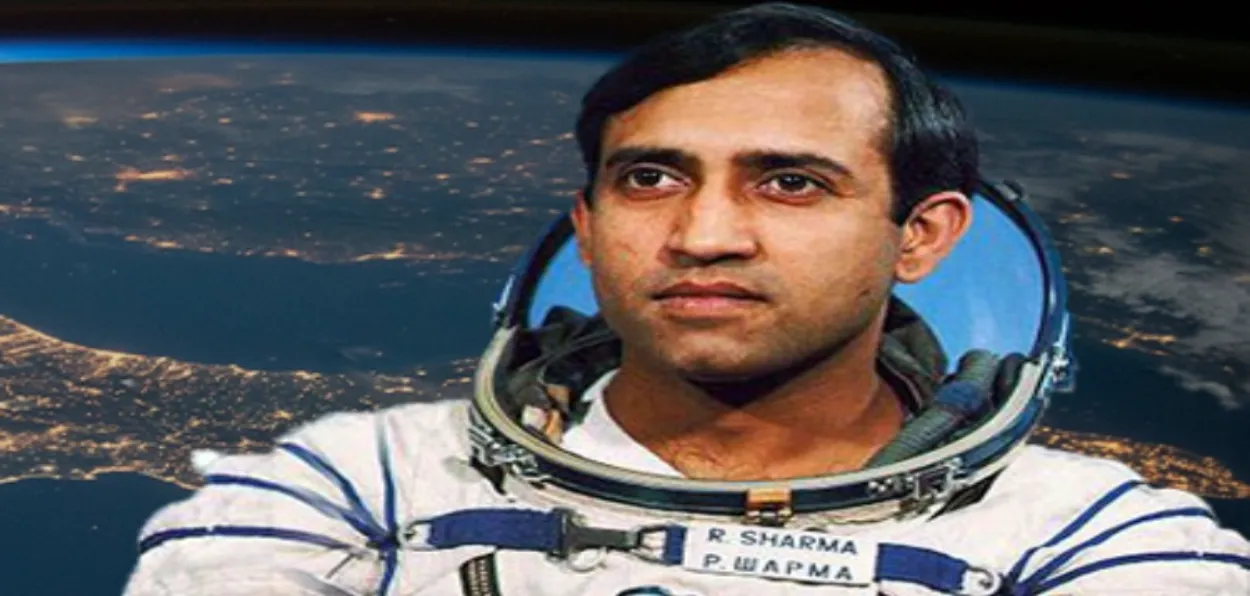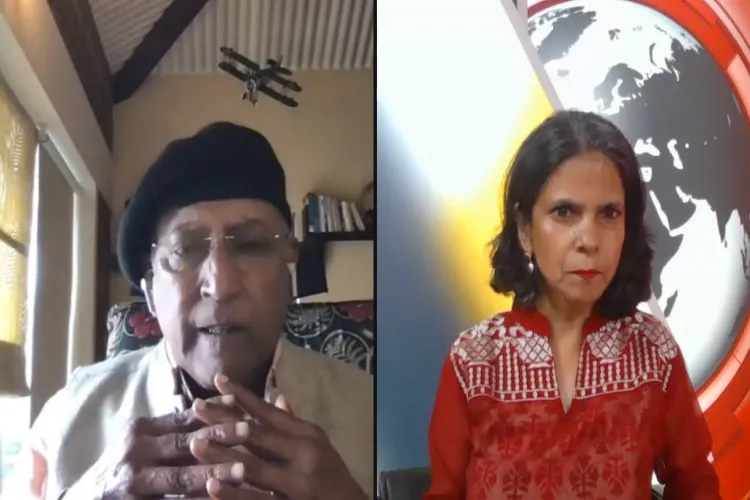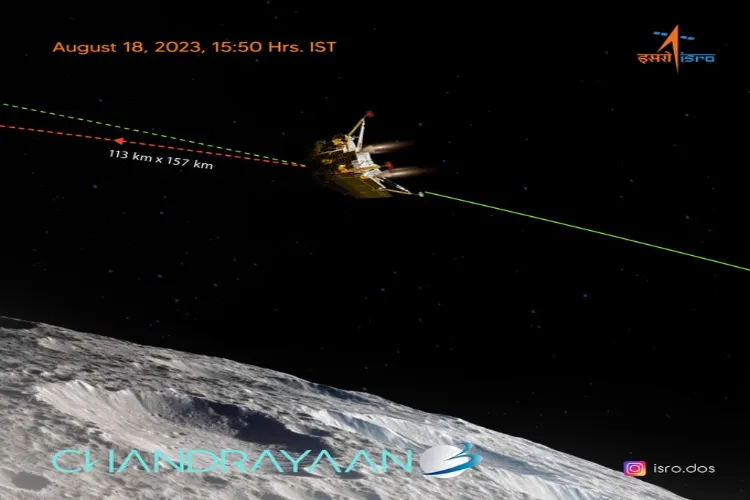
Tripti Nath/New Delhi
Nearly four decades after making a mark as the only Indian citizen to have entered space, Wing Commander Rakesh Sharma is looking forward to celebrating the success of Chandrayaan 3.
In an exclusive interview with Tripti Nath, Roving Editor, Awaz-The Voice, the former Indian Air Force pilot who was decorated with the Ashok Chakra, says his gut feeling on Chandrayan-3 is that it will succeed. Asked whether India will be celebrating on August 23, Wing Commander(retired) Sharma replied, “Most certainly. We will be.’’.
Sharing his reflections about India’s space exploration journey, he said that India’s forte is innovation, it has earned a seat on the high table along with other space powers and is in a position to influence space policy.
Excerpts from the interview:
Union Minister Jitendra Singh recently said, "India is the fifth among spacefaring nations having end-to-end capabilities in space research and development, including the capability to launch from our own land and operate programmes of earth observation, satellite communication, meteorology, space science, navigation and ground infrastructure. To what extend do you agree with him?
I agree with him totally because what he is telling us really is indeed the journey ISRO has been making these last four or five decades and it has really been spectacular. Despite technology denial, we have been making steady progress starting off with very small baby steps and today, we are not only preparing to launch a manned space programme and our own astronauts but we are also putting satelites in orbit for friendly nations as a commercial venture. The launcher is ours. We know how to manufacture satelites. We are part of scientific programmes which are run by global space powers and we have also demonstrated a safe return from space of the capsule unmanned and also an autonomously landing remotely piloted vehicle which is a scaled down model- say of the space shuttle. We have got end to end capabilities today.

Rakesh Sharma speaking online with Tripti Nath
The fate of the Chandrayaan-3 mission is uppermost on everybody’s minds and everybody is checking out ISRO images at regular intervals. What would its success mean for India?
Yes, that is how it has transpired. If the Russian attempt had succeeded, they would have landed a day or two earlier. Unfortunately, their craft has crashed into the moon surface- on the southern side- the dark side. We have still got two more days. I am quite confident and I am hoping that we succeed this time. As you well know that we have lost our previous attempt- the Chandrayaan 2. Those glitches hopefully have been fixed by ISRO.
After a wait of more than three decades, a manned mission is targeted for launch in the fourth quarter of 2024? It has been over three decades from the time you went to space and is therefore natural to ask if it bothers you that your record would be broken?
You know that there is a very good reason why there has been this gap of 39 years actually and that is because, ISRO has been doing a very focused programme based on a blueprint laid down by Dr Vikram Sarabhai. He had insisted that the benefits of space technology should trickle down to improve the lives of the citizens of our country. This whole programme was designed in such a manner that the trickle down effect improve the country’s economy, improves the reach of education, healthcare, disaster management, communication connectivity, weather forecasting. ISRO has remain focused on that initial part of the blueprint. It was a very courageous move to come this far because India for the most part had been developing nation. It is only now that we are knocking at the door of being called a developed nation. They had to prioriitze. They did not have the bandwidth to do everything at the same time.
That is why the manned programme was put on the backburner but now having realized most of the aims of Dr Vikram Sarabhai, we design our own satellite, we put them in orbit, we milk the data which has been helping the economy of our country and in various other spheres. Now is the time to do other stuff and that other stuff is Science. We are getting ready- that is why Chandrayaan, Manglayaan- Aditya is waiting in the wings. Now, that is where we are. It is necessary to do all of that primarily because of our success rate and the way ISRO has run the programme, we have got a seat on the high table along with other space powers.We are in a position to influence space policy and that is really required with space exploration picking up.
What do you think of space sector reforms announced by the government in June 2020? Prime Minister Narendra Modi has taken path-breaking decisions, like unlocking the Space sector for Public Private Partnership (PPP). It is estimated that based on the current trajectory of growth, India’s space sector could be a one trillion US dollar economy in the coming years.
Yes. I think, it was inevitable that this would happen. The reason is that now that we have established our credibility as a launch service provider and customers are queuing up. We run our space programmes very frugally and we are highly competitive in this market-that of putting satelites into space. So, with so many customers queuing up to use our services, ISRO’s bandwidth once again was getting clogged. It was taking their focus away from science collaboration and manned spaced programme. It was getting very difficult for ISRO to manage both. So, routine stuff is being done by the private industry quite like it has been done in the developed countries as well and ISRO is continuing to successfully do the research and development and further exploration.
 I
I
mages of Chandrayaan-3 inching closer to Moon released by the ISRO on social media
What are the challenges that India’s space exploration programme is facing?
One is that of trained manpower. In the past, we have lost people due to brain drain- a lot of Indians are working for NASA. Recruitment of indigenous talent for future research work- that is the other. Space being a very niche sector, the employment opportunities are rather limited. However, I would say that with the industry opening up to the private sector, things are definitely bound to improve. It is very necessary to attract talent, to catch people young, to fire their imagination as Dr Kalam had also mentioned. That is the way to go about it. When I visit education institutions, I see that people want to take up this but everybody should know what they are getting into. It should not be a herd mentality as it has been in the past when the software industry was booming. This will require a different kind of focus, work and application but I am sure that the Indian intrinsic capability to innovate will remain intact and that is where we are counting and we have a demographic dividend for that sort of thing.
How would you rate the annual special Young Scientists programme (Yuva Vigykaryakram YUVIKA) launched by ISRO in 2019 which has been attended by 603 students in 2019, 2022 and 2023.
That is what is going to net quite a few interested youngsters. When I was bringing up my children, it was my intention also to try and expose them to various professions. I think, this is a very good move- with the youngsters having visited all the ISRO Space centres and they can see from up close what is the kind of work that is being done and understand the challenges. And all of this is going to fire their imagination and those who are really keen are going to stay, make it their dream and make it their aim to achieve excellence in their chosen field. We need intelligent youngsters who can continue this trajectory of ISRO which has up to now been very good.
This conversation will be incomplete if I do not ask you about your incredible space journey in the summer of 1984
It was difficult but what worked for me or what would have worked for anybody from our country who was selected to go up that it was such an interesting opportunity. Space has always enamoured every generation. When I was a school kid, Yuri Gagarin went up. Then the moon shots happened. It was like Science fiction coming alive and the same kind of feeling is being awakened once again with the Indian manned space programme waiting in the wings to take off.
Both Ravish Malhotra and myself had to learn a new language. We had to adjust to professionals of a new country and adjust to a new country. The professional part of it was not that challenging because both Ravish and myself were experienced test pilots when we were selected. The rest of the adaptation was difficult.
You asked about the flight. There is a limited amount of training that can be given primarily because it is difficult to replicate zero gravity for long periods of time on earth. It is physically impossible.
A lot of that learning was on the job but one had read up about it. All of that helped us. By the time you come down, everything reverses because now you are back in gravity and the human body has to readapt to the presence of gravity. But adaptation and readaptation to earth’s gravity, within a day- day and a half, you are back to the new normal. That is the beauty of the human body.
Lastly, with the newfound thrust on space exploration by this government, is India likely to reach a stage where it gets its own go-getter like Elon Musk?
As far as Elon Musk is concerned, my only hope is that whatever solution we come out with, we think through and see what the further effects are of the new Science we are going to be doing. For example, Science had split the atom but it ended up making an atom bomb- a nuclear arsenal.
ALSO READ: Indian Ulema must move on in their thoughts
Let’s see what kind of Science we are doing. The stated intention really is to get to know our celestial neighbourhood and may be to inhabit the moon first. I do not know if an individual needs to do it.
The vision is there, the brains are there, the wherewithal is there with our economy getting ready to boom- become a five trillion economy. It seems to me that our systemic improvement is going to take us through. We just need good policy makers. We just need continuity so that things don’t keep changing at short notice.
